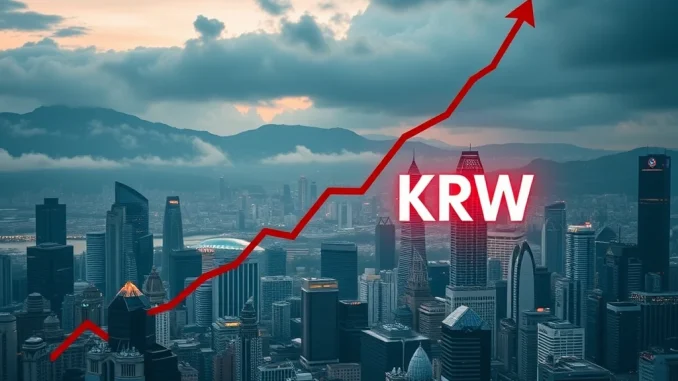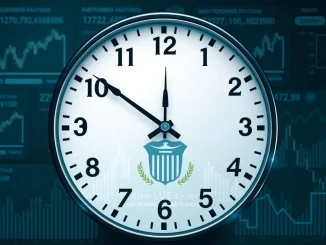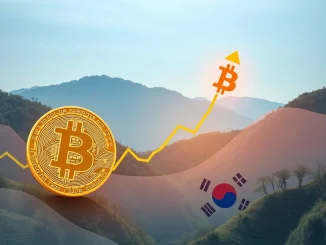
Buckle up, crypto enthusiasts and market watchers! A seismic shift is rocking the financial landscape, and it’s hitting South Korea hard. The USD/KRW exchange rate has just experienced a jaw-dropping surge, reaching levels not seen in nearly five years. If you’re tracking global economic trends and how they ripple through the crypto sphere, this is a development you absolutely need to understand. Let’s dive into what’s happening and why this sudden Korean Won devaluation is sending shockwaves through the markets.
What Triggered This Dramatic USD/KRW Exchange Rate Spike?
Imagine waking up to find your local currency suddenly worth significantly less against the US dollar. That’s essentially what happened in South Korea as the USD/KRW exchange rate leaped by a staggering 33.7 won, closing at 1,467.8 won per dollar on April 7th (UTC 06:30). Reported by Yonhap News, this isn’t just a minor fluctuation; it’s the largest single-day jump since the tumultuous early days of the COVID-19 pandemic. But what’s fueling this financial earthquake?
- Global Economic Uncertainty: The world stage is currently fraught with economic uncertainty. Factors like rising inflation, aggressive interest rate hikes by the US Federal Reserve, and geopolitical tensions (such as the ongoing situation in Ukraine) are creating a risk-averse environment. Investors often flock to the US dollar as a safe haven during times of turmoil, increasing demand and pushing its value up.
- South Korea’s Economic Outlook: While South Korea has a robust economy, concerns about its growth trajectory could be contributing to the Won’s weakness. Factors such as slowing global demand for Korean exports (particularly in key sectors like technology) and domestic economic pressures can influence investor sentiment and currency valuations.
- Currency Market Volatility: The foreign exchange market is inherently volatile, reacting swiftly to news and global events. Speculative trading and algorithmic trading can amplify movements, leading to rapid and significant shifts in exchange rates.
- External Shocks: Unforeseen global events can trigger sudden shifts in currency values. While the exact trigger for this specific surge might be multifaceted, it’s crucial to recognize that external shocks play a significant role in currency market volatility.
Why Should Crypto Enthusiasts Care About the Won’s Plunge?
You might be thinking, “What does the Korean Won’s struggle have to do with crypto?” The answer is: more than you might realize. Here’s why this financial shock in the Korean currency market should be on your radar:
- Global Market Interconnectedness: The cryptocurrency market doesn’t exist in a vacuum. It’s deeply intertwined with traditional financial markets. Significant movements in major currencies, like the Korean Won (especially in a tech-heavy economy like South Korea), can reflect broader market sentiment and risk appetite.
- Risk-Off Sentiment: When traditional markets experience volatility and currencies like the Won weaken, it often signals a “risk-off” environment. In such scenarios, investors may become more cautious and reduce exposure to perceived riskier assets, which can include cryptocurrencies.
- Potential for Capital Outflows: A weakening Won could lead to capital outflows from South Korea as investors seek to move their assets into stronger currencies or perceived safe havens. This could potentially impact liquidity in Korean crypto exchanges and the broader Korean financial market.
- Economic Indicator: Currency movements are often leading indicators of economic health. A significant and rapid Korean Won devaluation can be a symptom of underlying economic pressures or anxieties, which can have ripple effects across various asset classes, including crypto.
Is This a Repeat of the COVID-19 Era Financial Shock?
The comparison to the early days of the COVID-19 outbreak is striking. Back then, global markets were in freefall as the pandemic’s scale and impact became clear. The rush to the US dollar as a safe haven was intense, leading to similar spikes in USD/KRW exchange rate and other currency pairs.
While the current situation shares the characteristic of a rapid Won depreciation, the underlying causes might be different. The COVID-19 shock was primarily driven by a sudden, exogenous health crisis. Today, the economic uncertainty is more multifaceted, stemming from a combination of inflation, interest rate policies, geopolitical risks, and potential economic slowdown. However, the market reaction – a flight to safety and a stronger dollar – is exhibiting similar patterns.
What’s Next for the USD/KRW Exchange Rate and the Korean Economy?
Predicting currency movements with certainty is notoriously difficult. However, here are some key factors to watch that will likely influence the USD/KRW exchange rate and the broader Korean economy:
| Factor | Potential Impact on USD/KRW |
|---|---|
| US Federal Reserve Policy | Continued aggressive interest rate hikes by the Fed are likely to further strengthen the US dollar, potentially pushing the USD/KRW exchange rate even higher. |
| Bank of Korea (BOK) Policy | The BOK’s response, particularly its interest rate policy, will be crucial. If the BOK is less aggressive than the Fed in raising rates, the Won could weaken further. Conversely, strong action by the BOK to defend the Won could provide some support. |
| Global Economic Growth | A slowdown in global economic growth, particularly in major economies that are key trading partners for South Korea, could negatively impact the Korean economy and put downward pressure on the Won. |
| Geopolitical Developments | Escalating geopolitical tensions could further fuel risk aversion and strengthen the US dollar, while de-escalation could potentially ease pressure on the Won. |
| Korean Economic Data | Upcoming economic data releases from South Korea (e.g., inflation, GDP growth, trade balance) will be closely watched. Weak economic data could exacerbate concerns about the Korean Won devaluation and further weaken the currency. |
Navigating the Financial Shock: Key Takeaways
The sudden surge in the USD/KRW exchange rate and the Korean Won devaluation serve as a stark reminder of the interconnectedness of global financial markets and the ever-present currency market volatility. For crypto enthusiasts and investors, this event highlights several crucial points:
- Stay Informed: Keep a close watch on global economic news and currency market movements. These events can provide valuable insights into broader market sentiment and potential risks.
- Diversification is Key: In times of economic uncertainty, diversification across different asset classes and geographies can help mitigate risk.
- Understand Risk-Off Signals: Currency weakness in economies like South Korea can be an early warning sign of risk-off sentiment in global markets. Pay attention to these signals and adjust your investment strategies accordingly.
- Long-Term Perspective: While short-term volatility can be unsettling, maintain a long-term perspective. Market fluctuations are normal, and understanding the underlying economic trends is crucial for informed decision-making.
Conclusion: A Wake-Up Call for Global Market Watchers
The dramatic rise in the USD/KRW exchange rate is more than just a currency fluctuation; it’s a financial shock that underscores the complex and volatile nature of the global economy. For those involved in the cryptocurrency space, understanding these traditional market dynamics is essential. The Korean Won devaluation and the factors driving it offer valuable lessons about economic uncertainty, currency market volatility, and the interconnectedness of our financial world. Stay vigilant, stay informed, and navigate these turbulent times with knowledge and a strategic approach.



